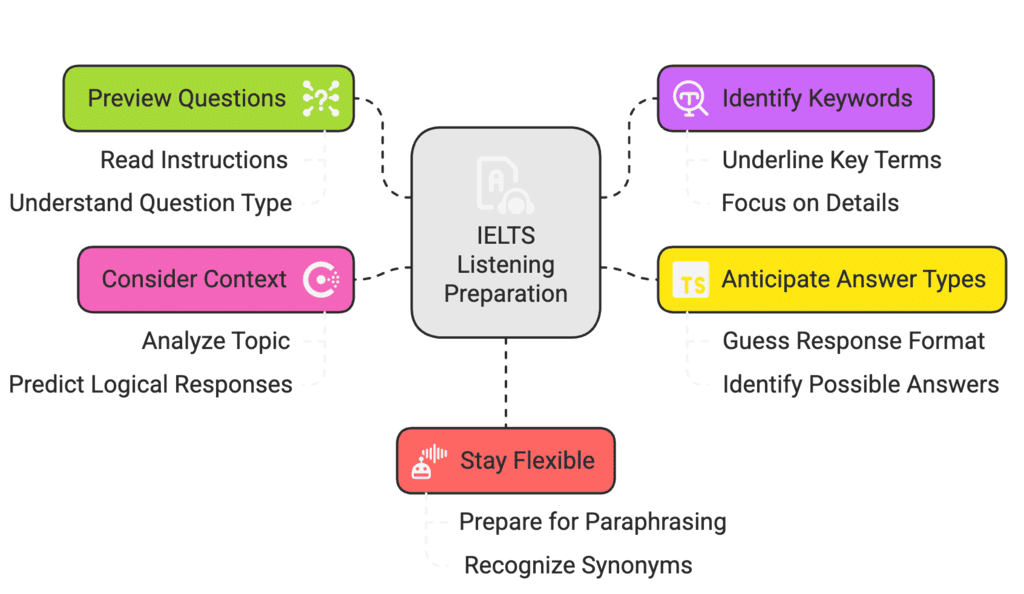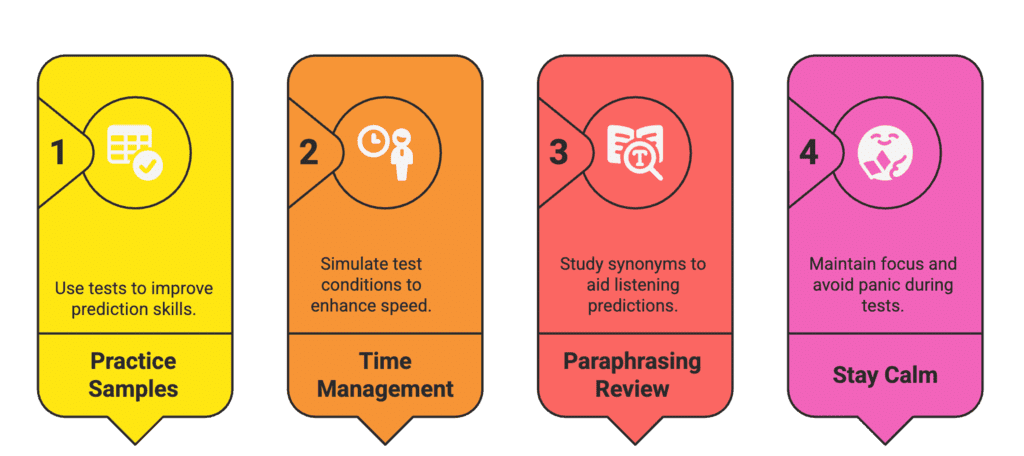Tips: Predicting Answers in the IELTS Listening Test | Listening for IELTS PDF Download
| Table of contents |

|
| Importance of Prediction |

|
| General Prediction Strategies |

|
| Prediction by Question Type |

|
| Practical Tips for Success |

|
| Why It Works |

|
The IELTS Listening Test evaluates your ability to comprehend spoken English across four sections, featuring diverse question types such as Sentence Completion, Multiple Choice, and Diagram Labelling. A key skill to excel in this test is the ability to predict answers before the audio begins. This document outlines strategies to anticipate answers effectively, improving accuracy, speed, and confidence.
Importance of Prediction
Predicting answers allows you to focus on relevant information during the recording, reducing the risk of missing key details. It prepares your mind to recognize expected words or ideas, even if paraphrased, and helps manage the time pressure of the 30-minute test. Mastering this technique can significantly enhance your Listening band score.
General Prediction Strategies
- Preview the Questions (1-2 Minutes): Before the audio starts, quickly read the questions and instructions for the section. Identify the topic and question type (e.g., filling a gap, choosing an option).
- Identify Keywords: Underline or highlight key words in the questions (e.g., “location,” “time,” “purpose”) to guide your listening.
- Anticipate Answer Types: Guess the kind of answer needed—e.g., a number, name, or phrase—based on the question structure.
- Consider Context: Use the topic or scenario (e.g., a university lecture, a travel booking) to predict logical responses.
- Stay Flexible: Be ready for paraphrasing or synonyms, as the audio may not use the exact words in the question.

Prediction by Question Type
1. Sentence Completion
- Approach: Look at the incomplete sentence and predict the missing word or phrase. Focus on grammar (e.g., singular/plural, verb tense) and context.
- Example: For “The course starts on ___,” predict a date (e.g., “Monday”) or month (e.g., “June”).
- Tip: Expect nouns, dates, or times. Listen for signal words like “on” or “at” to confirm.
2. Summary Completion
- Approach: Skim the summary to grasp the main idea, then predict words that fit the gaps based on the topic.
- Example: For “The event aims to ___ local traditions,” predict a verb phrase like “promote” or “preserve.”
- Tip: Look for adjectives or verbs that align with the summary’s focus. Watch for paraphrases like “support” instead of “help.”
3. Form Completion
- Approach: Review the form fields (e.g., “Name,” “Address”) and predict specific details like proper nouns or numbers.
- Example: For a “Date” field, anticipate “12th April” or “2023.”
- Tip: Listen for spellings of names or numbers spoken slowly, and note any word limit (e.g., “one or two words”).
4. Multiple Choice
- Approach: Read the question and options, predicting which might fit based on logic or the topic.
- Example: For “What is the main topic? A) Sports B) Music C) Art,” if the section is about a concert, lean toward B) Music.
- Tip: Eliminate unlikely options and listen for clues that match your prediction, even if rephrased.
5. Short Answer Questions
- Approach: Analyze the question to predict a brief response, considering question words (e.g., “where” = place, “why” = reason).
- Example: For “Where is the meeting?” predict “conference room” or “hall.”
- Tip: Expect concise answers (e.g., two words max). Focus on exact phrases from the audio.
6. Table Completion
- Approach: Skim the table headers (e.g., “Time,” “Activity”) and predict details that fit each column.
- Example: For a “Time” column, anticipate “9 a.m.” or “afternoon.”
- Tip: Listen for order or sequence in the audio to match rows correctly.
7. Diagram Labelling
- Approach: Study the diagram to predict labels for parts (e.g., “engine,” “wing”) based on its context.
- Example: For a car diagram, predict “brake” or “battery” for a blank near a wheel.
- Tip: Listen for descriptive terms (e.g., “located here”) to pinpoint answers.
8. Map/Plan Completion
- Approach: Examine the map or plan and predict labels for landmarks or locations (e.g., “library,” “park”).
- Example: For a blank near a road, predict “shop” or “station.”
- Tip: Note directions (e.g., “to the left”) and match them to the map’s layout.
9. Flow Chart Completion
- Approach: Review the flow chart’s steps and predict actions or stages (e.g., “mix,” “heat”).
- Example: For a cooking process, predict “add ingredients” for a blank step.
- Tip: Listen for sequence words (e.g., “next,” “then”) to place answers in order.
Practical Tips for Success
- Practice with Samples: Use practice tests to hone prediction skills. Record your guesses and compare them to the answers.
- Time Yourself: Simulate test conditions (e.g., 30 minutes) to build speed in previewing and predicting.
- Review Paraphrasing: Study common synonyms (e.g., “begin” for “start”) to adjust predictions during listening.
- Stay Calm: If unsure, stick to your prediction and listen closely—panic wastes time.

Why It Works
Prediction sharpens your focus, making you an active listener rather than a passive one. It aligns with the IELTS Listening band descriptors, where Band 7+ candidates demonstrate “understanding of main ideas and specific details” with “effective use of strategies.” Regular practice with these techniques can elevate your score by reducing errors and boosting efficiency.
|
104 videos|39 docs
|
FAQs on Tips: Predicting Answers in the IELTS Listening Test - Listening for IELTS
| 1. What is the importance of prediction in the IELTS Listening Test? |  |
| 2. What are some general prediction strategies for the IELTS Listening Test? |  |
| 3. How does predicting answers differ by question type in the IELTS Listening Test? |  |
| 4. What practical tips can help improve success in predicting answers during the IELTS Listening Test? |  |
| 5. Why do prediction strategies work effectively in the IELTS Listening Test? |  |















